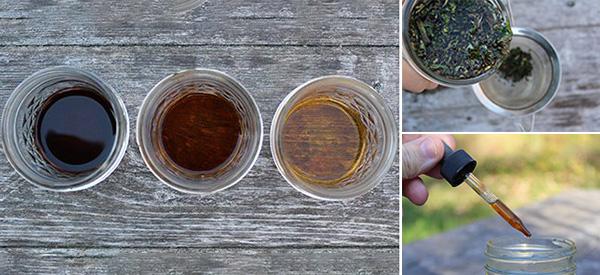
How to Make an Alcohol Extraction with Goldenseal to Fight Inflammation
A tincture is a great way to extract the powerful medicine locked away in plants and preserve it for later use. While teas will spoil within a few days, tinctures will keep at room temperature for months if not years – yes, years – without spoiling or losing their effectiveness.
While some medicines are soluble in water and will come right out of the plant material in a simple tea, other medicines need something a bit stronger for extraction. The anti-inflammatory compounds in Goldenseal are a good example. Goldenseal can be boiled for hours without extracting the most potent anti-inflammatory compounds. A simple alcohol solution, on the other hand, can pull this out with ease.
Some compounds are water-soluble, while others are only alcohol soluble. Other compounds, like the immune-boosting compounds in Echinacea, are extraditable either by water or alcohol. Do your research, and find out if the herb you’re trying to use is best used as a tea or tincture.
If your herbs are alcohol soluble, it’s actually remarkably simple to make your own tinctures at home.
Start
Start with a non-reactive seal-able container, such as a glass jar. Choose your herbs, either fresh or dried. For a tincture, it’s fine to use either. Just know that you’ll need more fresh herbs to achieve the same strength as you would dried.
Chop
Finely chop your herbs with a knife, or grind them down with a mortar and pestle to increase surface area. The more surface area, the more opportunity for the alcohol in your tincture to extract as much potent medicine as possible.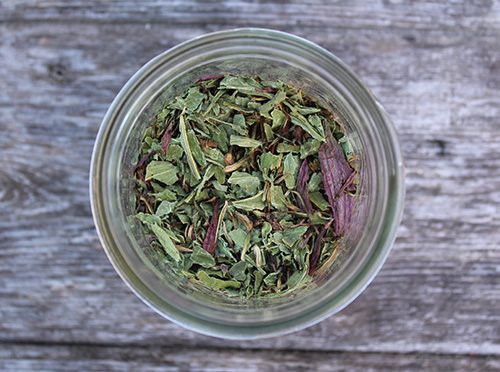
Measurements
There are a number of different ways to measure the herbs and adjust the strength of the tincture, but regardless of how much herb material you measure, the final strength will largely be determined by the strength of the herbs you start with. There’s a lot of variation in plant material based on how it was grown and stored before use.
The folk method of tincture, which is by far the most popular for home use, takes this into account and skips weighing and measuring the herbs. Just pack the herbs into a jar, and cover completely with a neutral alcohol, such as vodka.
As you take your medicine, you’ll need to adjust the dose to both the strength of the herbs and your constitution.
Alcohol
In choosing alcohol for your tincture, ideally you’re looking for an alcohol around 80 proof for most herbs. Higher alcohol percentages, like those in grain alcohol or ever-clear, are necessary for extracting resins, but shouldn’t be used for more delicate plant matter.
Technically, just about any type of alcohol can be used to make a tincture. If you have an abundant supply of whiskey, rum or gin around but no vodka, that works just fine in a pinch. The flavor will be different, but that’s not necessarily a bad thing.
If infusing in whiskey helps you (or a reluctant loved one) take their medicine, by all means go for it. An effective medicine is one that you’ll use, so make sure that you choose both herbs and an alcohol that fits the patient.
If you’re shopping specifically for a tincture, choose the cheapest vodka you’d voluntarily drink. For me, that’s one or two steps up from the bottom shelf. Remember, you’re going to have to drink this medicine and if you choose something particularly harsh, you’re much less likely to take your medicine.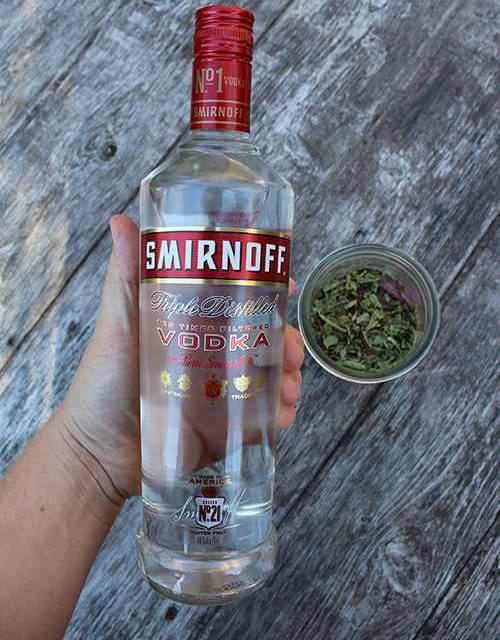
How To
Pour the alcohol into your jar of herbs, and be sure that all the herbs are submerged. The herbs will need to stay submerged while you store your jar in a cool dark place for 4-6 weeks to extract. Every 2-3 days, or as often as you remember, shake your jar to help the extraction.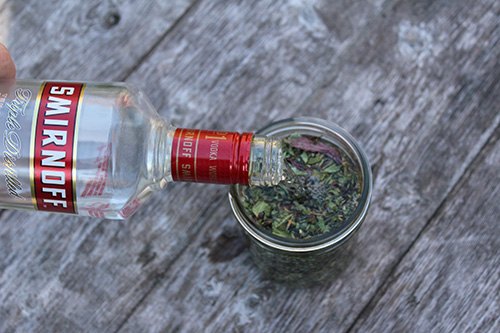
Once the extraction is complete, strain the herbs out using cheesecloth or a fine mesh strainer, and discard the herbs.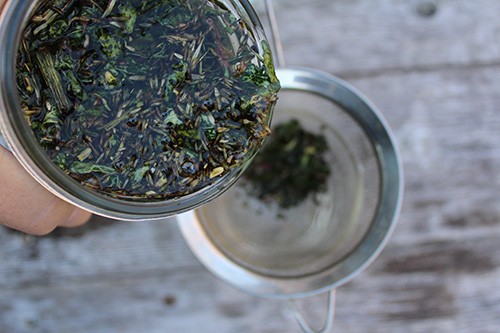
While it may be tempting to try to extract those herbs a second time into a tea or right into another tincture, each time I’ve tried it I was sorry I did. What’s left is bitter and unpleasant, even if the starting herb was something as lovely as elderberries. Stick to a single extraction, trust me on this one.
At this point, your tincture is ready for use. Store it in tinted glass, like dark brown colored tincture dropper bottles, or something with a similar tint to prevent sunlight from deteriorating your herbal medicine. In a pinch, any clean, dark colored bottle that caps securely will work. Lacking tinted glass, be sure to keep your tincture in a dark cupboard for storage.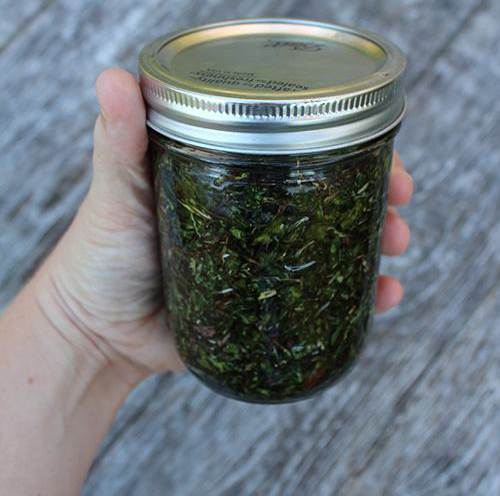
Dosage will depend on the tincture and your constitution. Some take tinctures with an eye dropper. Milder tinctures, like elderberry or chamomile, can be poured into a small shot glass.
For bitter herbs, like Echinacea, it’s best to dilute a dropper full of the finished tincture in a glass of water or juice.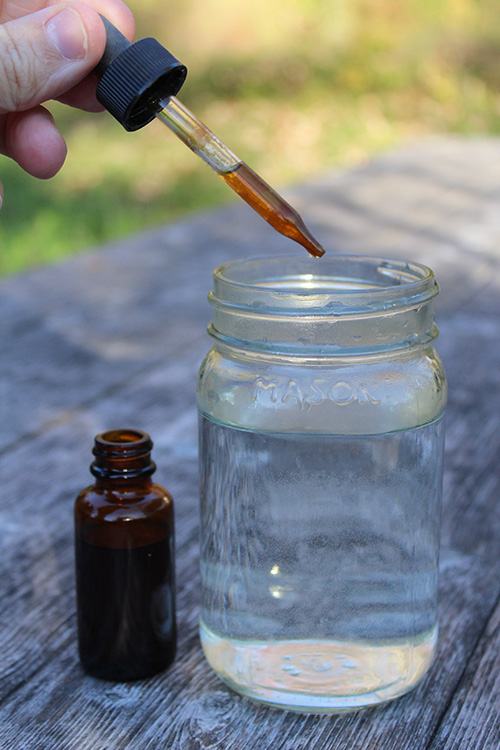
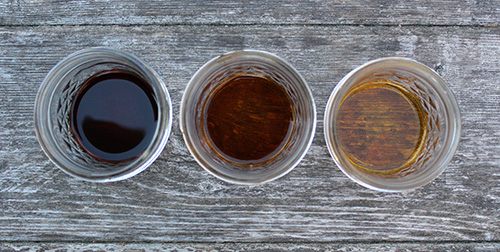
As always, with any medicine, be sure to watch for reactions and be careful about potential interactions with other medicines you’re taking, herbal or prescription.
You may also like:
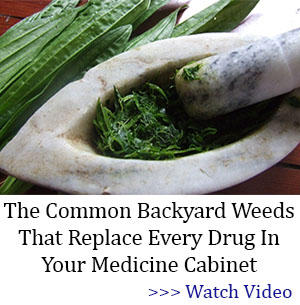 Potassium Permanganate: Why You Need It in Your Survival Kit?
Potassium Permanganate: Why You Need It in Your Survival Kit?
The Self-Sufficient Backyard (video)

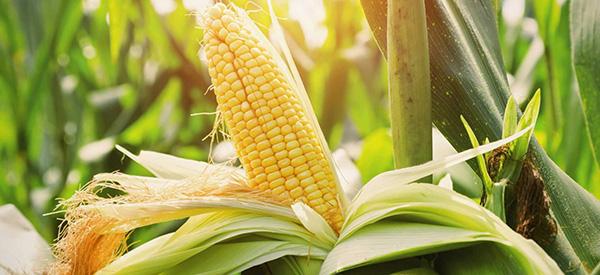
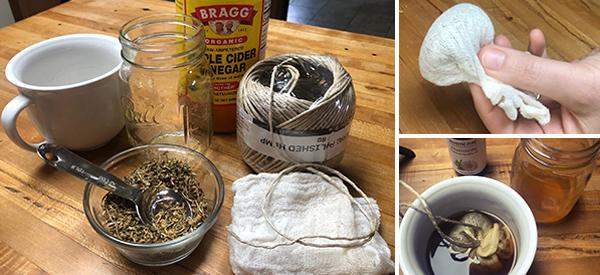
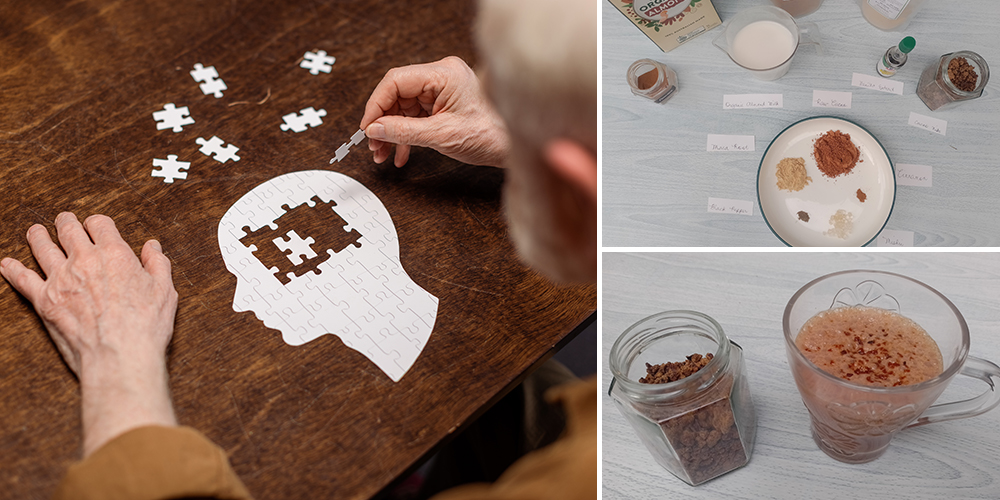
I have some lovely Goldensea, but it’s in a powder. I e scoured the internet, made phone calls to herb shops.. but no one is able to tell me HOW to make a tincture with finely powdered herb? Can you please tell me the proportions to use, I have a BIG bag of powder.
I wouldn’t think you could. I’m no expert, but there would be no way of straining it. I would save it for making salves or poultices. Also, goldenseal is expensive do you care sharing where you received such an abundance?
Thanks for your reply! One person in Hawaii suggested I could but just strain it through many layers of cheesecloth. Hmmmm. Goldenseal IS expensive ! I bought it on Etsy actually from an organic farm . My mom is currently hospitalized but if I can find a moment to look for the name of the farm I will share !
Elizabeth, you can find it if you haven’t already on the Monterey Bay Spice Company. 1/4 lb for $20.80 and ! lb for $52.00 Goldenseal leaves. seen it on other websites also and your right it is expensive.
I think it would be perfectly fine to make the tincture out of the powdered herb. Just measure out how much you’re using and cover it in alcohol. You’d need to strain it with super fine cheese cloth or some type of cotton such as a flour sack.
I would suggest using several layers of coffee filters.
It’s actually recommended it be in powder form for tincturing by percolation.
Thank you sincerely for your reply Taquoshi, so appreciated! You echo an herbalist in Maui I spoke to briefly so I may try it .. as I do have a good amount of it. I purchased it way pre-CoVID but it still looks good, smile.
Dear Sarah, thank you ALSO for your comment. I appreciate all your responses and perspectives.. I am just so grateful to have a forum to ask as I was getting so frustrated. I want to make it ASAP for my mom, and so I appreciate the quick replies. I have never heard of the percolation method as I am newer to making tinctures.. but you can bet I will be researching it now ! Thank you and many blessings to ALL, may you all stay healthy and SAFE.
I use a cloth handkerchief for straining. It does a pretty good job of getting the finer particles.
Is there no other way to use herbs for a tincures or anything, without using alcohol? We do NOT drink alcohol in any way!
Glycerine is used as an alternative……
Glycerin and water are the other options, but they’re not as effective for most plants. I think you’d have to increase the amount of herbs and steep it for a longer period of time.
would apple cider vinegar work?
alcohol extracts better than water, you can put tincture in your mug of hot herbal tea; alcohol evaporates (not sure if whole but certainly does)
Thanks for this advice
Hi Lillian,
Thank you so for your feedback. I really appreciate it.
Percolation tincturing….
Can or should you combine plants when making tinctures? I have been making tea using Bilberry, Chaga, Ashgawanda, Reishi and cinnamon. Should I do this separately?
thanks
,
Hi Thad, I’m not sure about the answer for that question but I would get the book, if you have it already the Lost Herbs book might have that answer.
I have left my alcohol tinctures in a Mason jar, after straining out the herb, covered with a coffee filter secured by a rubber band for weeks. If I’m correct, it allows the alcohol to evaporate out and the remaining tincture is more concentrated and has less alcohol taste.
Thank you so very much for this article. I’ve learned so much from you and your books. My family and friends have benefited greatly. Much appreciation.
One thing to be aware of is that a lot of vodka, especially the cheaper varieties, is distilled from grains and could affect someone with a gluten allergy. If this is a concern, you may want to make sure the vodka you use is the more traditional potato-based variety, which is generally going to be more expensive.
If I don’t have colored or amber containers I put a black sock over the container. Is sock is to big you can double it.